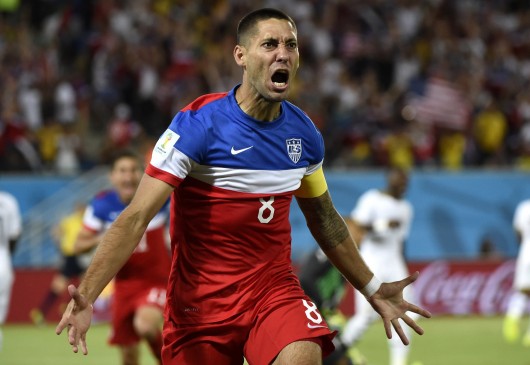
Clint Dempsey of Team USA celebrates his goal against Ghana during the World Cup in Natal, Brazil, on June 16.
Credit: Courtesy of MCT
One of the many beauties of sports is that they attract people for varying reasons. Some may consider it a vital part of their everyday lives, but for most it’s simply a release, a happy activity to focus on in an otherwise demanding life.
You might be having a lousy day, all your tasks still need to be done and you don’t have energy to do them – but if you’re like me, watching a game helps to make you forget about that. Tomorrow afternoon might bring a big exam that you’re woefully unprepared for, but at least you can watch a ballgame before you go to bed to help you feel better. If those types of things weren’t there, some of us would undoubtedly go crazy.
The irony is that the enjoyment that comes from watching any sport tends to diminish when the teams we actually care about are involved. Instead of enjoying the spectacle, you’re forced to constantly fret about the outcome, and it can become just another point of stress.
Of course, if your team is successful in the end you don’t regret putting yourself through the rigor. And luckily for myself, the hundreds of people around me, and the entire nation, the United States’ dramatic victory against Ghana on Monday made an agonizing game worth every second.
Even if American fans came into the game hoping to not get too caught up in proceedings, the manner in which the match unfolded made it basically impossible. An American goal inside of a minute gave the team the best possible start, except for the fact that taking such an early lead means that the players’ focus shifts subconsciously away from attack and instead to holding the advantage.
What followed was 80 minutes of pure tension. Every time Ghana so much as misplaced a pass there was considerable cheering among my fellow patriotic Americans. Any bit of respite for Americans felt like a goal in and of itself. For a while it seemed like the U.S. was going to pull it off, but 89 minutes is a very long time.
The injury to forward Jozy Altidore probably couldn’t have come at a more inopportune moment. Without Altidore’s physical ability up front, there was simply no outlet where the Americans could play the ball. Every clearance was just a chance for some of the U.S. defenders to catch their breath before another Ghana attack came toward them.
Meanwhile, U.S. fans never got the chance to exhale. The ordeal felt a lot like a job or a class where you look constantly at the clock, only to realize it’s barely moved a second since the last time you glanced up.
So it wasn’t that much of a surprise when the American defense was finally breached, albeit on a terrific passing move from the Ghanaians. The Americans weren’t just dead on their feet at that point; they already had been for a solid 20 minutes.
But you all know what happened next: the two substitutes, Graham Zusi and John Brooks, connected for a moment that was pure Hollywood.
In truth, the U.S. didn’t deserve the win. Ghana dictated the entire game, pushing the tempo as the Americans sat back and held on for dear life. But that’s not what wins soccer matches. What matters is taking your chances, and Americans did that in the most ruthless fashion possible.
In Portugal and Germany, the U.S. team has two games that will most likely be even tougher than their tussle with Ghana, but they do have an unquantifiable yet utterly important intangible running through their players’ veins: belief.
That’s been the big message from each U.S. soccer fan in the buildup to the World Cup: “I believe that we will win.” At times it can be misguided, but if Monday is anything to go by then anything can happen with an attitude like that.
Belief in a team might not make watching games like these any more manageable, but it can help to remind viewers that their nervous energy can ultimately result in unforgettable delight.


